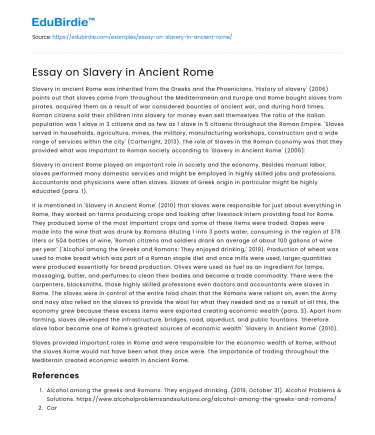Slavery in ancient Rome was inherited from the Greeks and the Phoenicians, 'History of slavery' (2006) points out that slaves came from throughout the Mediterranean and Europe and Rome bought slaves from pirates, acquired them as a result of war considered bounties of ancient war, and during hard times, Roman citizens sold their children into slavery for money even sell themselves The ratio of the Italian population was 1 slave in 3 citizens and as few as 1 slave in 5 citizens throughout the Roman Empire. 'Slaves served in households, agriculture, mines, the military, manufacturing workshops, construction and a wide range of services within the city' (Cartwright, 2013). The role of Slaves in the Roman Economy was that they provided what was important to Roman society according to 'Slavery in Ancient Rome' (2006):
Slavery in ancient Rome played an important role in society and the economy. Besides manual labor, slaves performed many domestic services and might be employed in highly skilled jobs and professions. Accountants and physicians were often slaves. Slaves of Greek origin in particular might be highly educated (para. 1).
Save your time!
We can take care of your essay
- Proper editing and formatting
- Free revision, title page, and bibliography
- Flexible prices and money-back guarantee
It is mentioned in 'Slavery in Ancient Rome' (2010) that slaves were responsible for just about everything in Rome, they worked on farms producing crops and looking after livestock intern providing food for Rome. They produced some of the most important crops and some of these items were traded. Gapes were made into the wine that was drunk by Romans diluting 1 into 3 parts water, consuming in the region of 378 liters or 504 bottles of wine, 'Roman citizens and soldiers drank an average of about 100 gallons of wine per year' ('Alcohol among the Greeks and Romans: They enjoyed drinking,' 2019). Production of wheat was used to make bread which was part of a Roman staple diet and once mills were used, larger quantities were produced essentially for bread production. Olives were used as fuel as an ingredient for lamps, massaging, butter, and perfumes to clean their bodies and became a trade commodity. There were the carpenters, blacksmiths, those highly skilled professions even doctors and accountants were slaves in Rome. The slaves were in control of the entire food chain that the Romans were reliant on, even the Army and navy also relied on the slaves to provide the wool for what they needed and as a result of all this, the economy grew because these excess items were exported creating economic wealth (para. 3). Apart from farming, slaves developed the infrastructure, bridges, road, aqueduct, and public fountains. 'therefore slave labor became one of Rome's greatest sources of economic wealth' 'Slavery in Ancient Rome' (2010).
Slaves provided important roles in Rome and were responsible for the economic wealth of Rome, without the slaves Rome would not have been what they once were. The importance of trading throughout the Mediterain created economic wealth in Ancient Rome.
References
- Alcohol among the greeks and Romans: They enjoyed drinking. (2019, October 31). Alcohol Problems & Solutions. https://www.alcoholproblemsandsolutions.org/alcohol-among-the-greeks-and-romans/
- Cartwright, M. (2013, November 1). Slavery in the Roman world. Ancient History Encyclopedia. https://www.ancient.eu/article/629/slavery-in-the-roman-world/
- History of slavery. (2006, August 21). Wikipedia, the free encyclopedia. Retrieved October 23, 2020, from https://en.wikipedia.org/wiki/History_of_slavery#Rome
- Slavery in Ancient Rome. (2006, May 29). Wikipedia, the free encyclopedia. Retrieved October 23, 2020, from https://en.wikipedia.org/wiki/Slavery_in_ancient_Rome






 Stuck on your essay?
Stuck on your essay?

